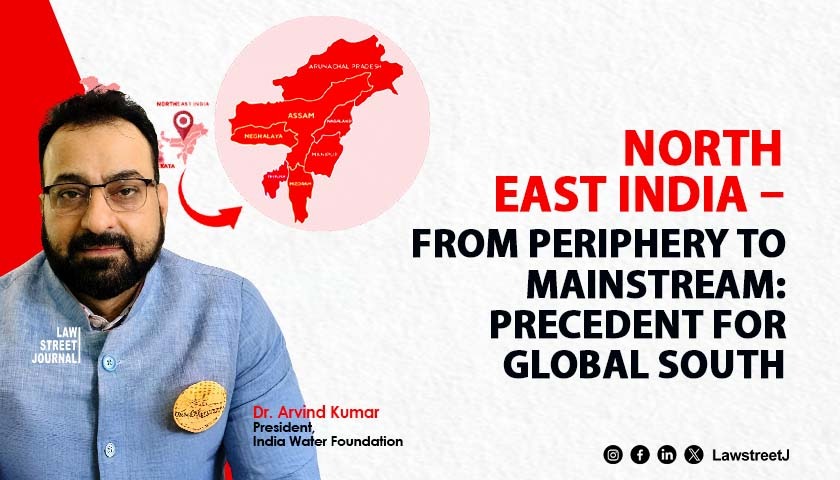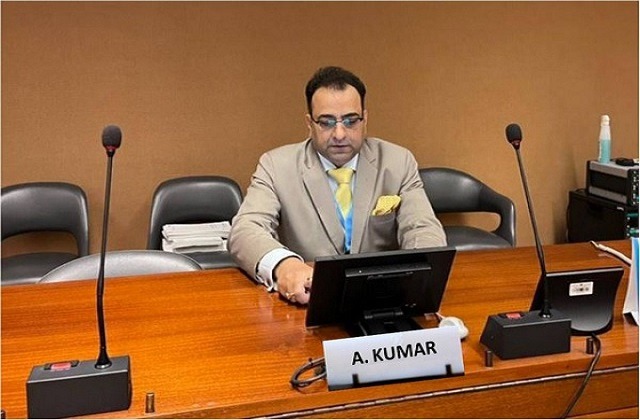New Delhi: The Northeast region of India was long viewed as a remote frontier—abundant in cultural wealth yet constrained by limited infrastructure that left its true potential untapped. Today, the region stands not just transformed but empowered, with better connectivity, stronger economies, and a renewed sense of purpose. The story of the Northeast is now one of peace, progress, and prosperity, a true reflection of a Viksit Bharat in the making.
The Northeast region of India, spanning the states of Arunachal Pradesh, Assam, Manipur, Meghalaya, Mizoram, Nagaland, Tripura, and Sikkim, has long grappled with a distinct set of challenges, including geographical isolation, inadequate infrastructure, fragile ecosystems, limited livelihood opportunities, and underdeveloped institutional capacities. These structural constraints have been further compounded by socio-political complexities, climate vulnerability, human rights violations, and persistent issues of integration and inclusion. Ethnicity has played a profound and multifaceted role in shaping the region’s social, political, and developmental trajectories.
In response, the Government of India has adopted a comprehensive, multi-pronged approach to address the region’s unique needs. By recognizing and respecting the distinct cultural and historical context of the Northeast, the government has implemented a blend of constitutional safeguards, political negotiations, localization and integration of Sustainable Development Goals, and targeted development initiatives through various programmes and schemes aimed at fostering peace, inclusivity, and socio-economic transformation. Measures such as infrastructure investments through the Ministry of DoNER and the Act East Policy have laid the foundation for more integrated and sustainable development.
Within this landscape, Meghalaya and Sikkim have emerged as frontrunners, pioneering inclusive and context-specific models of development. These states exemplify a holistic approach to water security, natural resource management, and livelihood generation by centering community participation, revitalizing traditional knowledge, and fostering partnerships among government, communities, civil society, donor agencies, and national and international institutions.
60th Session at UNHRC
The 60th session of the Human Rights Council kicked off its four-and-a-half-week session (8th September to 8th October 2025) in Geneva with an oral update by the High Commissioner for Human Rights, Volker Türk, on the global state of human rights.
In his update, the High Commissioner expressed his regrets over the growing trend of some States retreating and withdrawing from multilateral frameworks, institutions, and international agreements, including on climate change, human rights, and achieving the Sustainable Development Goals & the 2030 Agenda.
He also highlighted how stakeholders beyond the government can step up for human rights, including, for example, the role of cities in integrating human rights into urban governance, and national human rights institutions as an important defense against discrimination, abuse, and the erosion of the rule of law. He specified the example of the work of an NHRI that highlighted the effects of fossil fuels on the human rights of marginalized communities.
In the face of “coordinated efforts to undermine human rights and rule of law around the world,” the High Commissioner underscored the need for a cross-regional movement to defend the international system as the only viable path to reach collective solutions to the existential threats we face today. He invited the Council to a new initiative—an alliance of Member States, philanthropists, and civil society—to strengthen the human rights ecosystem. The various topics under discussion include clean water and sanitation, climate change, indigenous peoples, peasants, older people, and gender.
The India Water Foundation at the 60th Session of UNHRC
Highlighting the development trajectory of the Northeast region of India, India Water Foundation (IWF) organized a High-Level Policy Dialogue on “From Periphery to Mainstream: North East India’s Development Pathways” as an official side event of the 60th Session of the UN Human Rights Council (UNHRC), held at Building-A, Room-VII, Palais des Nations, Geneva.
The event brought together eminent leaders, policymakers, and experts to spotlight the transformation of Northeast India from a peripheral region to a vital growth engine of the nation. Distinguished speakers included Dr. Arvind Kumar, President, India Water Foundation; Ms. Mikiko Tanaka, Director, UN ESCAP South & Southwest Asia Office; Prof. Eddy Moors, Rector, IHE Delft; Dr. Pema Gyamtsho, Director General, ICIMOD; Mr. Vinod Mishra, Country Manager, UNOPS India; Ms. Shweta Tyagi, Chief Functionary, IWF; and Mr. Satheesh Kumar Damodaran, IT professional with the Swiss Government.
Dr. Kumar emphasized the region’s “synergy between connectivity, sustainability, and inclusivity,” citing landmark achievements such as Sikkim becoming the world’s first fully organic state, Mizoram attaining full literacy, and Assam hosting South Asia’s largest cancer care network. He underscored that “better convergence and higher community participation must be central to holistic development.”
Speakers highlighted the Northeast as a living model of sustainable growth, balancing infrastructure, ecological conservation, and human development. Prof. Moors underscored the region’s global potential through water collaboration and the need to couple local knowledge with institutional capacity-building. Dr. Pema Gyamtsho showcased ICIMOD’s ecosystem-based livelihood programs, flood early-warning systems, and cross-learning initiatives that link Northeast India with Himalayan partners.
Ms. Mikiko Tanaka underscored the growing role of cross-border trade and connectivity under BBIN, and the need to address non-tariff bottlenecks to unlock regional markets. Mr. Vinod Mishra pointed to SDG gains driven by initiatives like Jal Jeevan Mission and Swachh Bharat, while flagging urgent needs in climate action and regional equity. Mr. Satheesh Kumar Damodaran highlighted the role of multi-level partnerships between local states, the central government, civil society, and international actors and urged replication of Northeast successes through shared-learning platforms, digital tools, and citizen-centric governance. Ms. Shweta Tyagi moderated the session and highlighted youth, women, and digital empowerment through flagship schemes and community-led livelihood programs.
North East India’s Development Model
The North Eastern Region is no longer on the periphery of India’s development map; it is now firmly at the center of the nation’s growth narrative. Backed by visionary policymaking, record investments, and coordinated execution across ministries, the Northeast is witnessing a remarkable transformation. From improved rail and road connectivity to digital access, economic investments, and inclusive development initiatives, every effort is bringing the region closer to opportunity and prosperity. As infrastructure strengthens and aspirations take root, the Northeast stands poised to become a key driver of a Viksit Bharat, where every hill, valley, and village is part of the country’s shared future.
The India Water Foundation has consistently highlighted the inseparable connection between water, human health, and human development, with profound impacts on people’s lives and livelihoods.
To empower vulnerable indigenous and ethnic communities, IWF advocates for ecosystem-based solutions that complement local ecological and cultural systems, while promoting people-centric policies across health and nutrition, education, agriculture and water resources, financial inclusion, skill development, and basic infrastructure. Through its key inputs, governments have successfully fostered alternative livelihoods for native communities, mitigating unemployment, insurgency, unsustainable mining practices, and distress migration, while reducing poverty, advancing gender inclusion, and improving socio-economic and environmental indicators.
This transformation has significantly strengthened state economies and demonstrated that the health of people cannot be sustained without the health of the planet. The Northeast’s experience thus offers valuable lessons on how integrated, ecosystem-based development models can drive inclusive growth, climate resilience, and holistic well-being, forming the foundation of resilient communities.
Way Forward
North-East India stands at the crossroads of resource abundance, energy potential, and global geopolitics. As the region continues to integrate with the rest of India and the broader South Asian and Southeast Asian regions, it holds the promise of becoming a key player in the 21st century. With the right policies, investments, and international collaborations, North-East India is harnessing its resources and strategic location to drive economic growth, foster regional stability, and contribute to India’s rise as a global power. Acknowledging persistent challenges such as climate vulnerability and disaster risks, there is a need for deeper regional cooperation, innovative financing, integration of indigenous knowledge with modern planning, and stronger capacity-building at local and sub-national levels.
It is reaffirmed that Northeast India has a strategic role as a gateway to ASEAN and BIMSTEC economies and as a global example of inclusive, sustainable, and climate-resilient development pathways.
The transformation of the last decade in Northeast India is a story of resilience, reform, and renewed national integration. Once seen as a troubled periphery, the region is now emerging as a vital contributor to India’s growth story. Sustained development efforts, massive investments in infrastructure, targeted economic programmes, and the celebration of its cultural heritage have ensured that the Northeast is no longer viewed as a distant periphery but as an integral part of a rising, aspirational, and inclusive Bharat.
About the Author
Dr. Arvind Kumar, President and Founder of the India Water Foundation, is a strategist and key influencer in the development sector with more than 30 years of experience. He is an author, columnist, water and human rights pro-activist, and specializes in ecosystem-based adaptation and the water-energy-food nexus, with specific emphasis on the transversality approach of inter-linkages between water, environment, and SDGs. He is a Climate Policy Expert of the Article 6.4 mechanism roster of experts of UNFCCC. He has published over 500 research articles and holds a Ph.D. in Defense Studies. He edited a publication with SAC Dhaka titled “SAARC Outlook on Water-Energy-Food Nexus in SAARC Region.” He is also the author of the publications United Nations: 75 and Beyond (commemorating 75 years of the UN), Ecosystem-Based Adaptation (Elsevier London), India @75 and Beyond, and Friday Musings to commemorate 75 years of India’s independence.
Disclaimer: The views expressed in this article are solely those of the author and do not necessarily reflect the views of LawStreet Journal.











G S Chaudhary Sep 22, 2025
A very thoughtful mind blowing perspective.
Gajendra S Chaudhary Sep 22, 2025
This article is a valuable contribution — especially for readers interested in regional development models, sustainable development in frontier/peripheral regions, and India’s integration with its neighbouring region. It offers both a descriptive narrative of Northeast India’s transformation and normative suggestions for how its experience can have broader relevance